
38 minute read
Outdoor Activities
The warm climate and diversity of the landscape on the Balearics make them an excellent place for all types of sport. The most popular of these are, of course, water sports and you will find windsurfing, sailing and diving are all well catered for. Those looking for an activity holiday of this kind will have the chance to practise their favourite sports under professional supervision. Cycling, horse riding and golf are also popular in the islands and many travel bureaux and agents offer equipment hire, from yacht charter to bicycle rental. Some hotels also have their own facilities and can often hire out equipment.
Wind- and kite-surfers in Can Pastilla, on the west coast of Mallorca
Advertisement
Windsurfing
The conditions for windsurfing are not as impressive here as they are in the Canary Islands because the local winds are not strong enough for advanced surfers. As a consequence, the Balearic Islands are not popular with professionals, but this makes them a very good place for beginners to pick up some of the basic techniques. Although the number of schools is rather limited, all of the islands have at least one school that teaches basic windsurfing and offers equipment hire. Surfing enthusiasts will also be able to find suitable spots in the Balearic Islands, but do not expect the “ultimate wave”.
Sailing
Sailing is the most popular water sport in the Balearic Islands. Major international regattas include the King’s Cup and the Princesa Sofia Trophy held in Mallorca. These are highprofile events and attract many of the world’s leading sailors; King Juan Carlos was a frequent competitor. The Trofeo Almirante Conde de Barcelona, held in August, features regattas with classic sailing boats. Almost every coastal town has its own marina and these are visited by yachts from all over Europe. Many vessels remain here for the winter. Of course, you do not have to own a yacht in order to cruise the Balearic Islands. Many firms offer sea-going vessels for charter. Smaller inshore catamarans can be rented by the hour on local beaches. You can also find many clubs or schools that are able to teach you the rudiments of sailing.
The popularity of sailing is so great that during the high season the marinas tend to be very busy, even though the mooring charges are extremely high. Some boats moor in sheltered bays, accessible only by sea.
Fishing
Despite the fact that the local waters teem with fish, fishing is not a popular sport here. A few agents organize trips, however. Further information is available from the Asociación Balear de Pesca or from the Club Nautics.
Beach Activities
During the high season, beaches employ lifeguards so it is safer to bathe and swim. Most beaches are sandy and situated in small bays. Sailing yachts and fishing boats sometimes anchor at the mouth of the bay and these are only a hazard if you swim out too close to them. The beaches can be busy and are sometimes short of space for beach sports. Nevertheless, a few of them have areas designated for volleyball, and even on busy beaches you can still find space to kick a ball around or play frisbee.
Diving and Snorkelling
The clear, clean coastal seawaters, combined with the diversity of underwater flora
also take water-skiing lessons or (an easier option) bump along on a rubber raft, towed by a speeding boat.
Alternatively, visitors might like to join a sea trip by kayak. The most interesting routes go to the islands such as Conillera, near Ibiza, or Dragonera, off Mallorca. Equally exciting are trips to the waters of Formentor (Mallorca) and Cavalleria (Menorca).
Beach volleyball, popular throughout the islands
and fauna, create ideal conditions for diving, and the sport is as popular as sailing throughout the islands. Every seaside resort has at least one diving centre (centro de buceo) where you can hire equipment, go for a test dive with an instructor or enrol on a course. A one-week stay would be sufficient to complete the beginners’ course in scuba diving. The organizers ensure proper supervision by a qualified instructor and provide all the necessary equipment.
People hoping to dive in deeper waters must hold a proper diving certificate, such as PADI, CUC, CMAS/ FEDAS or SSI. Holders of these certificates can join expeditions, some of which explore underwater caves. One of the best places to dive is the water around Cabrera, about 18 km (11 miles) off the coast of Mallorca. In 1991, Cabrera and its surrounding waters were awarded the status of a national park – the first park of its kind in Spain. Diving here requires the permission of the park ranger.
A much cheaper but equally exciting way of getting a glimpse of underwater life is to go snorkelling. A snorkeller can observe the wonders of the deep while floating on the surface of the water almost anywhere. Perhaps the most interesting places are the small bays rarely visited by tourists, where nature has hardly been touched by the hand of humans. A word of warning: snorkelling can be dangerous if you are distracted and collide with nearby rocks.
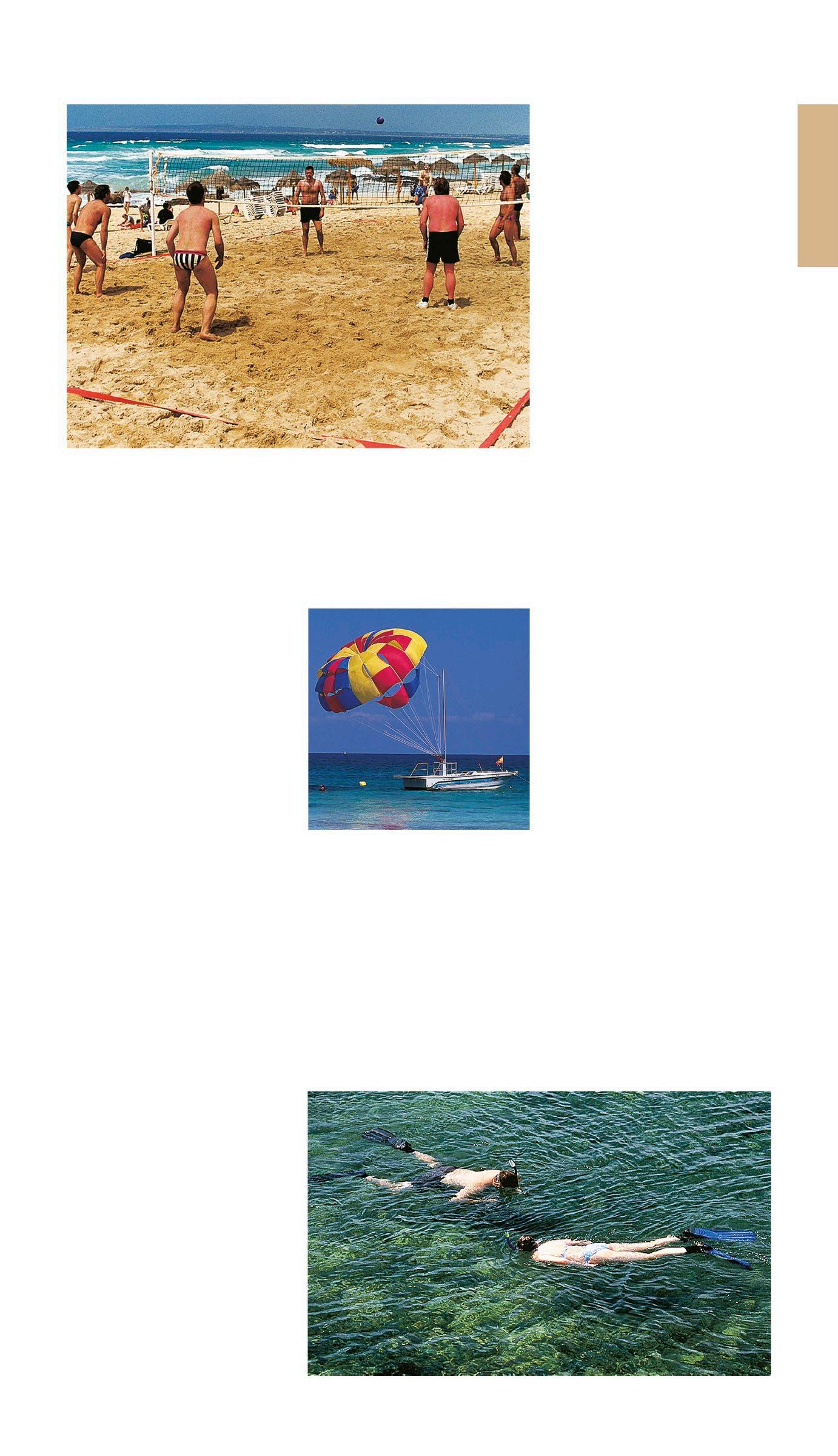
Motorboat with parachute waiting for the adventurous to paraglide
Other Water Sports
Other water sports that are popular with visitors include taking out a high-speed waterbike or paragliding. Paragliding behind motorboats (similar to hang-gliding) offers a wonderful way to see the islands. You can Hiking
Hiking around the islands is extremely popular. The best area for hiking is probably the mountainous regions of Mallorca. The trails leading through the Serra de Tramuntana are difficult; however, they offer a wonderful experience and breathtaking scenery. Trekking across the mountains along rough paths requires suitable footwear and clothing and this activity should not be undertaken alone, as there are potential hazards such as sudden changes in the weather and unexpected ravines. Menorca also offers many hiking trails. Most of these lead through the local nature reserves, of which the island has 18. The regions of S’Albufera, Cap de Favaritx and Cap de Cavalleria are truly magnificent areas for hiking. Many agents organize themed excursions, such as birdwatching trips. If setting off without a guide, you should make sure you have a good map, as many tourist trails are not signposted.
Cyclists in a boulevard in Palma, Mallorca
Two-Wheeled Sport
Cycling is very popular here, and renting a bicycle from one of the numerous hire firms is inexpensive. Cycling is an excellent way to explore the towns or get to a nearby beach. On the island of Formentera it is the most popular form of transport, along with the scooter. More ambitious cyclists may want to undertake longer trips, and all types of terrain can be encountered on the islands, from long, flat stretches of coast through to steep mountain roads. The islands also offer many interesting trails for mountain bikes, although the routes leading through the wild mountain terrains on Mallorca, or the coastal crags of Menorca, are best undertaken with a guide. Agents who organize these tours generally offer guides and equipment.
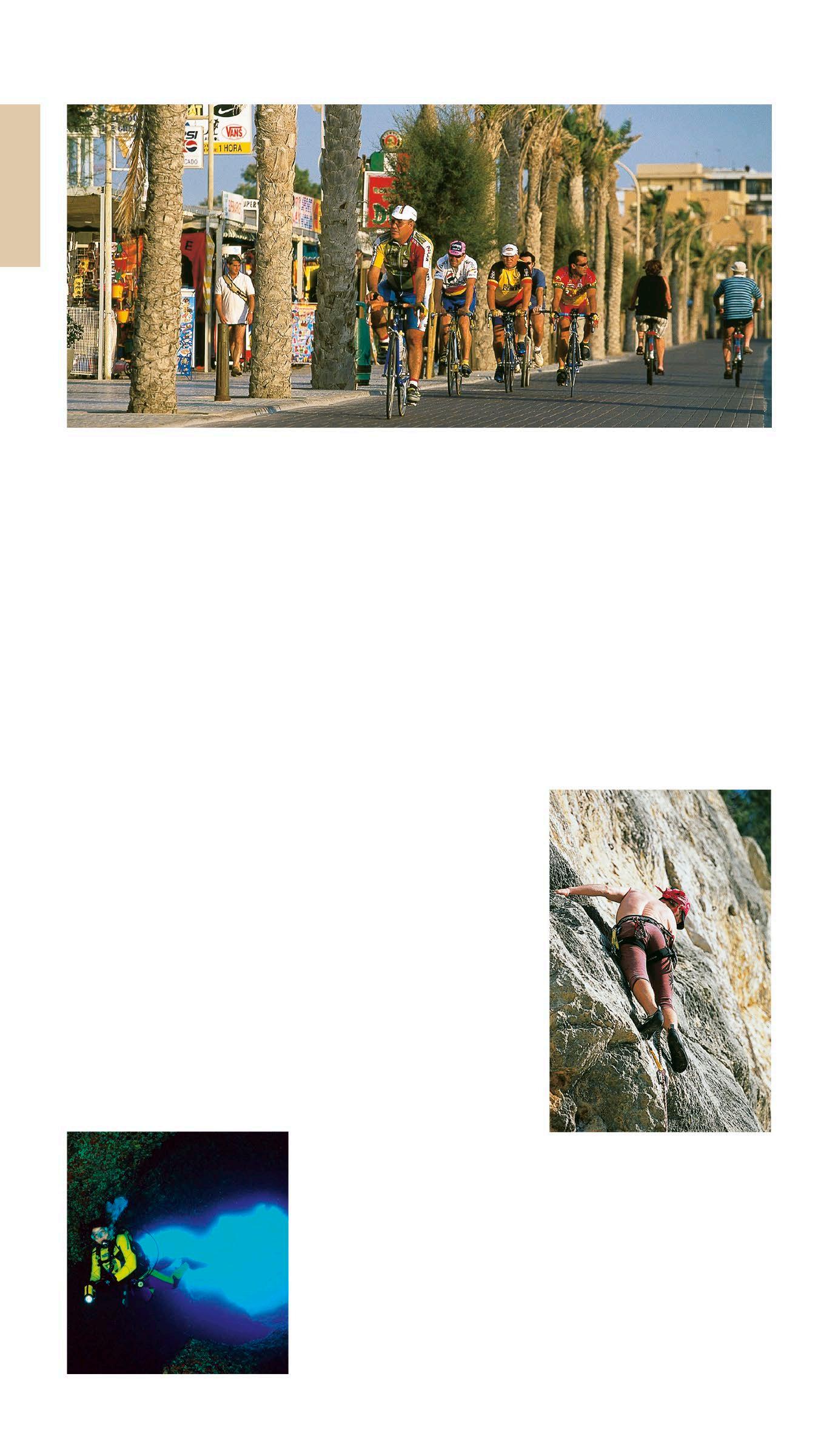
Horse Riding
Horse riding is another popular island sport and there are several riding centres on the islands that provide facilities for beginners as well as for advanced riders. The riding areas and trails are deliberately set amid beautiful scenery, but you should not expect romantic gallops along the beach. All horse riding is done under the supervision of an instructor. There are many riding centres in Menorca and this is where they breed the famous Menorcan black horses that play such a prominent part in many fiestas. As well as riding lessons and outings, many centres also stage displays of horse breaking. For those who fancy a flutter, regular horse races are held on Mallorca and Ibiza.
Caving
Caving and associated pursuits, such as canyoning and rock climbing, are still in their infancy in the Balearics but growing in popularity. Only a handful of Mallorca’s caves, including the Drac and Hams (see p84), are open to all; most are reserved for experienced potholers. Adventurers can therefore explore the caves of the Tramuntana mountains and, on Menorca, try sea-cave diving as well. Organized caving expeditions offer anything from a half-day guided starter’s cave trip, to day- and even week-long caving holidays, with all equipment provided. The steep rocks along the coast of Mallorca and the inland regions are good places for rock climbing, too, providing various degrees of difficulty. Companies such as Rocksport Mallorca offer walking, canyoning and rock climbing at beginner and advanced levels. Diving Center Ciutadella offers seacave diving training at various sites around the Menorca. Cave exploration can be dangerous and is only recommended for people who have been trained and have the proper equipment. Before embarking on any adventure sport, check your insurance cover.
Climber on a rock face near Valldemossa, Mallorca
Other Sports
The warm climate and varied terrain mean that most sports can be enjoyed somewhere in the islands. Surprisingly, for such a dry region, there are even places that are good for canoeing, a very popular sport in Spain but one that
requires a high level of fitness. When planning these expeditions you should seek advice from the organizers, who will not only inform you about the best routes but will also ensure suitable supervision.
The good aerodynamic conditions on Mallorca make the island suitable for hanggliding and paragliding (see p175). These sports are not popular in the other islands of the archipelago. The best lifting currents are found in the inland regions. This is where beginners’ courses are held and where you can also meet experienced hang-gliders. The islands’ weather conditions are also favourable for ballooning. A number of companies and some of the more exclusive hotels on the island can organize hot-air balloon flights.
Ballooning
Mallorca Ballons
Tel 971 596 969. ∑ mallorcaballoons.com
Caving
Diving Center Ciutadella
Ciutadella, Menorca. Tel 651 644 319. ∑ diveinnmenorca. com
Rocksport Mallorca
Tel 629 948 404. ∑ rocksportmallorca. com
Diving

Aqua Diving Center
Port Sant Antoni de Portmany, Ibiza. Tel 693 045 723. ∑ aquadivingcenter. com
Big Blue
C/ Marti Ros García 6, Palmanova, Mallorca. Tel 971 681 686. ∑ bigbluediving.net
Blue Water Scuba
Cala’n Bosch, Menorca. Tel 971 387 183. ∑ bluewaterscuba.co. uk
Octopus
Canonge Oliver 13, Port de Sóller, Mallorca. Tel 971 633 133. ∑ octopus-mallorca. com
Skualo
Passeig Cap d’es Toll 11, Porto Cristo, Mallorca. Tel 971 815 094. ∑ skualo.com
DIRECTORY
Vellmari Formentera Diving
Marina de Formentera 14, Puerto de la Savina, Formentera. Tel 971 322 105. ∑ vellmari.com
Fishing
Asociación Balear de Pesca
C/ Joan Miró, 325, Calanova, Palma, Mallorca. Tel 971 702 088.
Federación Española de Pesca y Casting
Navas de Tolosa 3, Madrid. Tel 915 328 352. ∑ fepyc.es
Hiking
Dia Complert
Passeig Marítim 41, Fornells, Menorca. Tel 609 670 996. ∑ diacomplert.com
Ecoibiza
Juan Carlos 1, Edificio Transat, Eivissa, Ibiza. Tel 971 302 347. ∑ ecoibiza.com
Mallorca Activa
Son Pereto 9, Palma, Mallorca. Tel 971 783 160. ∑ mallorcaactiva.com
Horse Riding
Ca’n Paulino
Ctra Vieja de Algaida s/n, Llucmajor, Mallorca. Tel 664 384 924. ∑ canpaulino.com
Hípica Son Gual
Ctra Puigpunyent to Establiments, km 6.2, Palma, Mallorca. Tel 608 532 096. ∑ hipicasongual.com
Menorca a Cavall
Ctra Es Mercadal- Ferreries, km 24, 3 Santa Rita, Es Marcadel, Menorca. Tel 971 374 637. ∑ menorcaacavall.com
Riding Academy Mallorca
See p173.
Sailing
Centro Wet Four Fun
Platja d’Es Pujols, Formentera. Tel 609 766 084. ∑ wet4fun.com
Club Náutico el Arenal
C/ Roses s/n, S’Arenal, Mallorca. Tel 971 440 142. ∑ cnarenal.com
Club Náutico Ciutadella
Cami de Baix s/n, Ciutadella, Menorca. Tel 971 383 918. ∑ cnciutadella.com
Club Náutico Porto Cristo
C/ Vela 29, Porto Cristo, Mallorca. Tel 971 821 253. ∑ cnportocristo.com
Club Náutico Sant Antoni
Paseo Marítimo s/n, Sant Antoni de Portmany, Ibiza. Tel 971 340 645.
∑ esnautic.com
Escuela Balear de Náutica
C/ Aragón 28 bajos, Palma, Mallorca. Tel 971 909 060. ∑ escueladenautica. com
Real Club Náutico de Palma
Muelle de Sant Pere s/n, Palma, Mallorca. Tel 971 726 848.
∑ rcnp.es
Windsurfing
Cesar’s Watersports
Playa S’Arganassa, Santa Eulalia del Rio, Ibiza. Tel 971 330 919 or 670 629 961 (mobile). ∑ watersportscesars. com
Club Náutico Sa Ràpita
Explanada del puerto s/n, Sa Ràpita, Mallorca. Tel 971 640 001 or 971 641 535 (courses). ∑ cnrapita.com
Windsurf Fornells
Bahia Fornells, Menorca. Tel 664 335 801. ∑ windfornells.com
Golf in the Balearics
Golf is well established in the Balearic Islands, with a growing number of modern and environmentally sensitive golf courses on Mallorca, Menorca and Ibiza. Blessed with a mild climate and boasting excellent facilities, these courses attract golfers all year round. The Federación Balear de Golf oversees a total of 26 courses on the three larger islands, as well as an everexpanding range of competitions and trophies, training and practice facilities, and junior championships. Formentera has a ferry link that makes a round of golf on Ibiza a viable possibility.
General Information
The Balearic Islands’ golf culture is relatively new compared to the sport’s history, which means that courses have been designed to meet the demands of the modern golfer. They are also mindful of the fact that golfers are here for a holiday. In addition to training and activities (some organize tournaments, for example), all courses offer extensive leisure amenities – clubhouses, restaurants, bars and shops. Spain’s forwardthinking attitude towards the disabled has led to the active promotion of access, facilities, training and tournaments for disabled golfers at the Real Golf de Bendinat course in Mallorca. There are golf tournaments every week of the golf year, although the most important date is the Baleares Doubles, held at Mallorca’s Golf Santa Ponsa II course in June. Green fees range from €50 to €150 a day, depending on the course and the season. Many clubs and holiday agencies offer discounts on fees and equipment hire. All of the golf courses included in the directory listings are recommended by the Federación Balear de Golf.
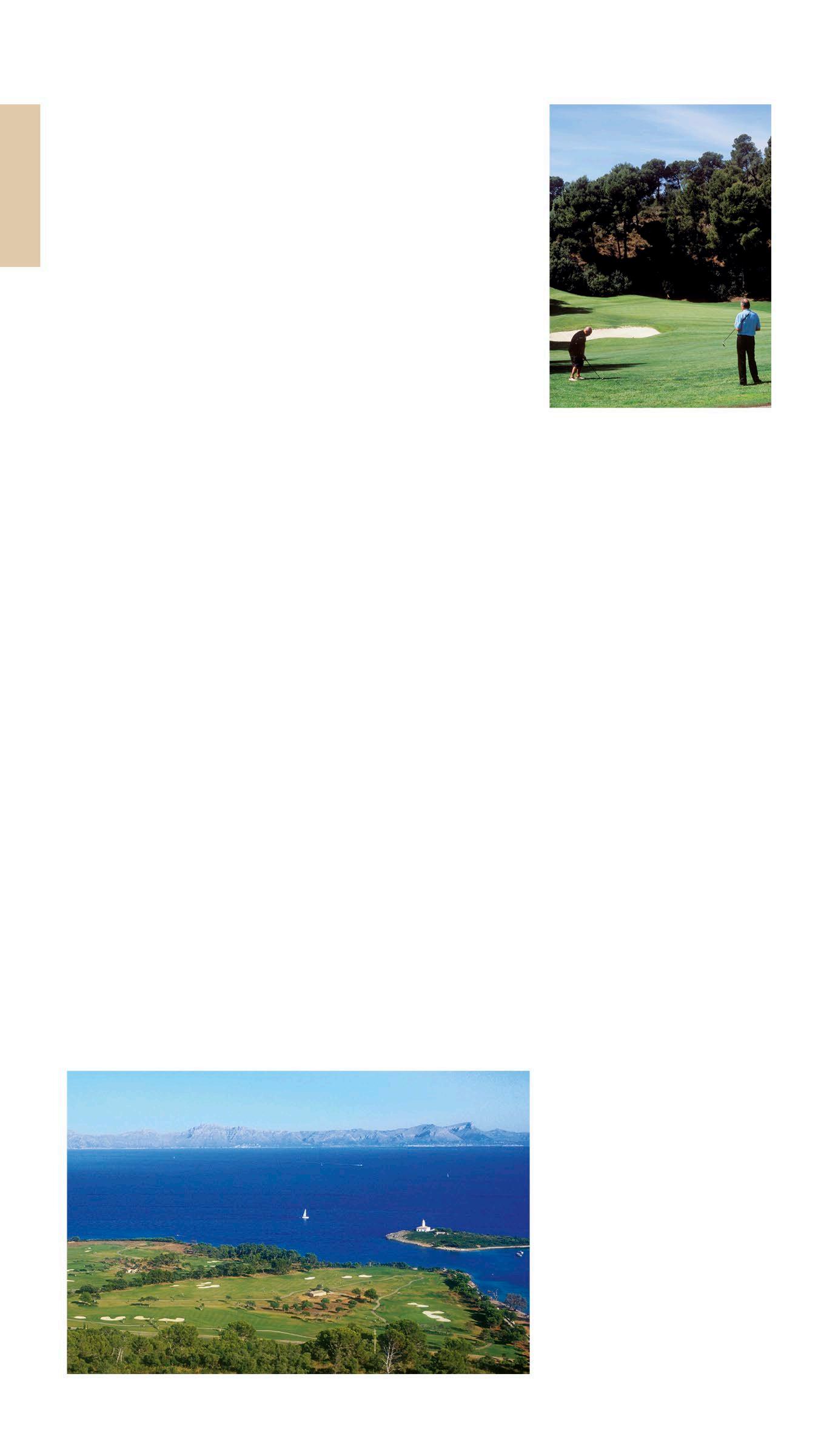
Mallorca
The first ever golf course in Spain opened on Gran Canaria in the Canary Islands only in 1891, some 200 years after St Andrews in Scotland. The first golf course in the Balearics was the Golf Son Vida, opened in 1964 a few kilometres outside Palma, in an idyllic valley setting with views of the sea and the Serra de Tramuntana mountains. Most Balearic golf courses offer extensive and modern facilities, in addition to advanced groundsmaintenance technology. Already considered one of the key golf destinations in Europe, Mallorca is drawing leading course design architects such as Robert Trent Jones Jr, Bradford Benz, Falco Nardi and José Gancedo.
Teeing off on one of the many courses in the Balearic Islands
In 1967, Son Vida was followed by the Golf Son Servera course, designed by John Harris, near Artà. It was another 10 years before the next golf course opened; the first of the (now three) Golf Santa Ponsa courses, designed by Falco Nardi, is still the largest on the island. It was followed in 1978 by another John Harris course, Golf de Poniente, still regarded as one of the toughest on Mallorca. Laid out among pine and olive groves, the par72 Poniente has 18 holes and a number of “characterbuilding” bunkers planted along its recorrido (course). The 1980s and 1990s saw another 23 courses open in quick succession in the Balearic Islands. Perhaps the ultimate so far is the exclusive Arabella Golf, opened in 2000 and winner of two awards for sensitive ecological course management. Golf Son Termens has also been praised for its sympathetic approach to preexisting landscape in its planning. Most courses cater to all levels of player ability, although a few are designed to put even the most experienced enthusiast through their paces. Golf de Pollença, for example, integrated among ancient olive groves on a gentle hill overlooking the Bahia de Pollença, admits that “none of the holes is easy”, and deems most to be suitable for mid to highexperience players and professionals. The Robert Trent
Jones Jr-designed Golf Alcanada, opened in 2003, is blessed with sea views of the splendid Bahia de Alcúdia from every hole, although players are advised to beware the 58 bunkers Jones has included in the design of this idyllic but testing course. Golf de Andratx has declared each of its holes a reto, or challenge, while the course at Golf de Canyamel is still considered the toughest on the island. Landscape and climate make Mallorca an ideal setting for golf. It is impossible to say which golf course boasts the most impressive architecture, although Son Muntaner is the most exquisitely manicured. Golf de Capdepera is set in a lush valley surrounded by scenic mountains, while the Poniente is set among mature pine and olive woodlands. The most striking course is Pula Golf, whose grounds, located in an old country estate, are shared with some of the most important talayot structures on the island. Ibiza
Menorca
The only golf course on the island of Ibiza, Golf de Ibiza is something of an oddity. The old Roca Lisa nine-hole course has now been absorbed into the larger, neighbouring Golf de Ibiza, Menorca and Ibiza are still a with a new 18-hole course, considerable way behind giving it a 27-hole total. The Mallorca; however, it is only shorter course is said to be a matter of time until they the easier terrain; however, catch up. Menorca’s main all 27 holes are still described course, Golf Son Parc, is an as difficult. unusual course with a 69 par and an ingenious course by Dave Thomas that requires strategic thinking to negotiate rocky bunkers, several lakes, reedbeds and, not least, a resident colony of peacocks. The challenging course of Golf de Ibiza
General Information
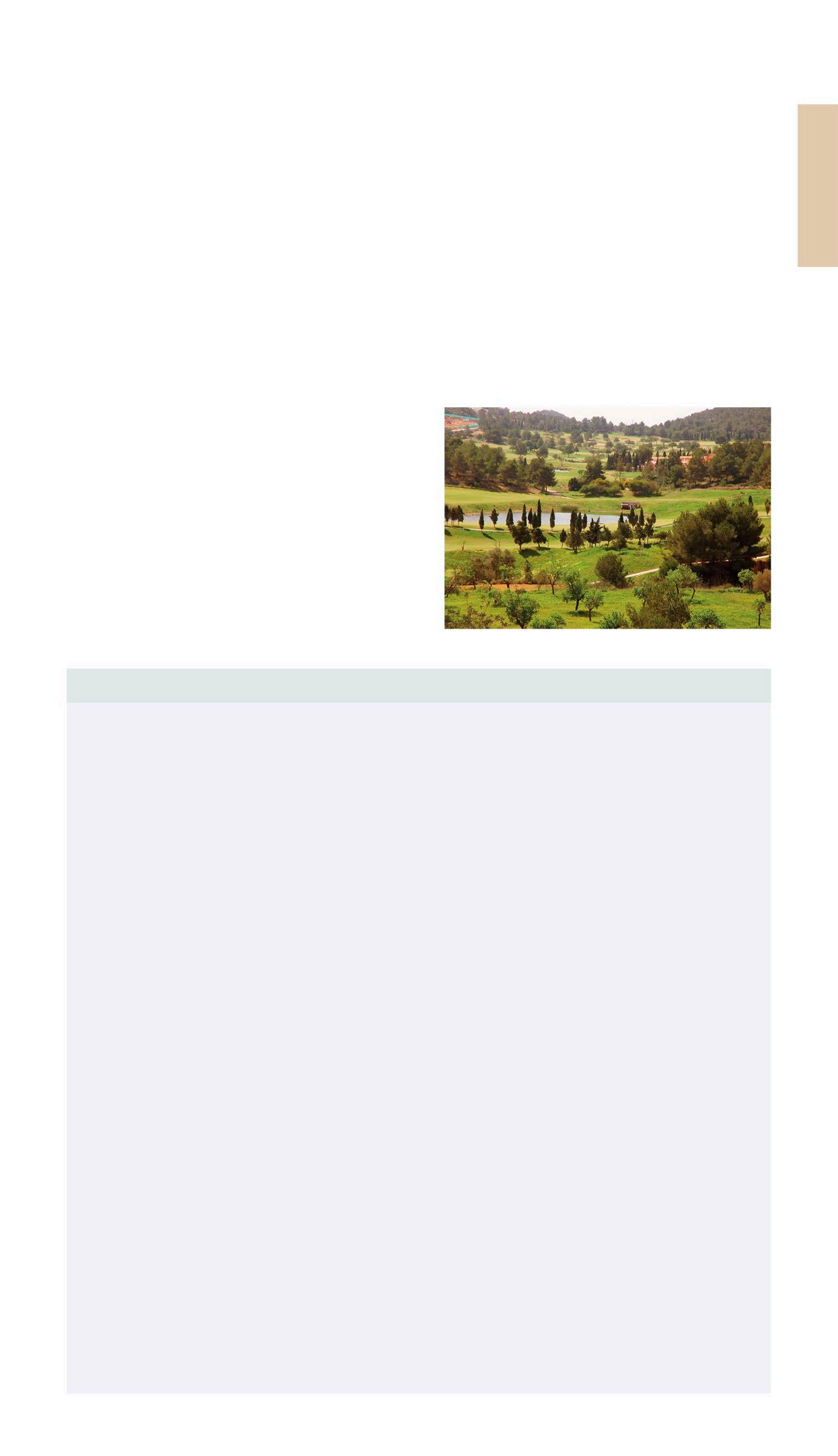
Federación Balear de Golf
Camí Son Vida 38, 07013 Palma de Mallorca. Tel 971 722 753. ∑ fbgolf.com
Mallorca
Arabella Golf
Ctra Son Vida, 07013 Palma. Tel 971 783 000. ∑ arabellagolf mallorca.com
Golf Alcanada
Carretera del Faro s/n, 07400 Puerto de Alcúdia. Tel 971 549 560. ∑ golf-alcanada.com
Golf de Andratx
Carrer Cromlec 1, 07160 Camp de Mar. Tel 971 236 280. ∑ golfdeandratx.com
DIRECTORY
Golf de Canyamel
Avda dęs Cap Vermell s/n, 07589 Capdepera. Tel 971 841 313. ∑ canyamelgolf.com
Golf de Capdepera
Carretera Artà–Capdepera, km 3.5, 07570 Artà. Tel 971 818 500. ∑ golfcapdepera.com
Golf in Mallorca
∑ golfinmallorca.com
Golf de Pollença
Carretera Palma–Pollença, km 49.3, 07460 Pollença. Tel 971 533 216. ∑ golfpollensa.com
Golf de Poniente
Carretera Cala Figuera s/n, 07182 Magaluf. Tel 971 130 148. Fax 971 130 176. ∑ ponientegolf.com
Golf Santa Ponsa I, II & III
Av. Golf s/n, 07180 Santa Ponsa. Tel 971 690 211. ∑ golf-santaponsa. com
Golf Son Servera
Urbanización Costa de los Pinos, 07550 Son Servera. Tel 971 840 096. Fax 971 840 160. ∑ golfsonservera.com
Golf Son Termens
Carretera S’Esglaieta, km 10, 07110 Bunyola. Tel 971 617 862. Fax 971 617 895. ∑ golfsontermens.com
Golf Son Vida
Urbanización Son Vida, 07013 Palma. Tel 971 791 210. Fax 971 791 127. ∑ sonvidagolf.com
Pula Golf
Carretera Son Servera– Capdepera, km 3, 07550 Son Servera. Tel 971 817 034. Fax 971 817 035. ∑ pulagolf.com
Real Golf de Bendinat
C/ Campoamor s/n, Urb Bendinat, 07181 Calviá. Tel 971 405 200. Fax 971 700 786. ∑ realgolfbendinat. com
Vall d’ Or Golf
Ctra. cala d’Or Portocolom, km 7.7, 07669 S’Horta (Felantix). Tel 971 837 001. ∑ valldorgolf.com
Menorca
Golf Son Parc
Urbanización Son Parc s/n, 07740 Es Mercadal, Menorca. Tel 971 188 875. ∑ golfsonparc menorca.com
Ibiza
Golf de Ibiza
Carretera Jesús a Cala Llonga s/n, 07840 Santa Eulària des Riu. Tel 971 196 052. Fax 971 196 051. ∑ golfibiza.com
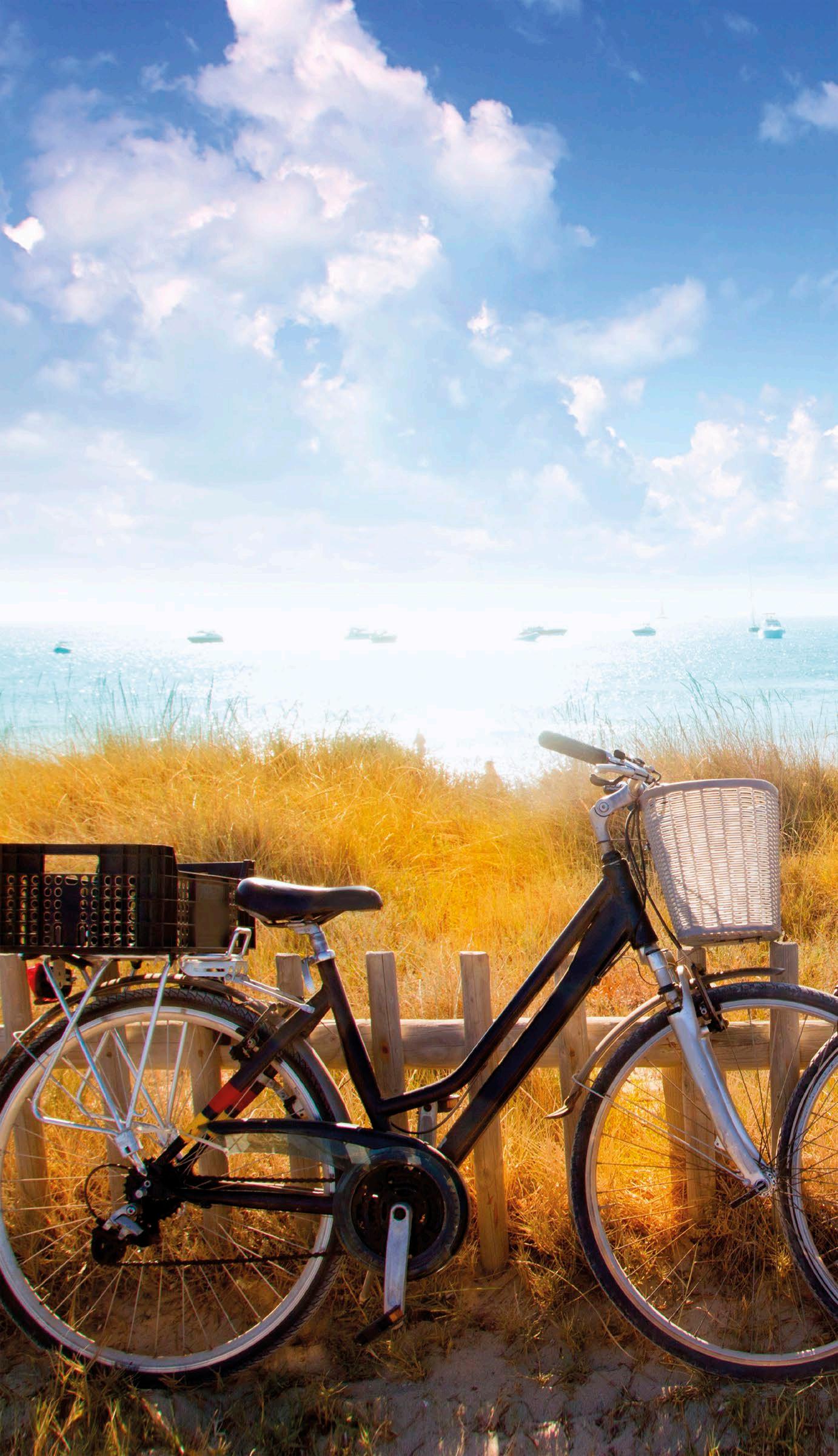
SURVIVAL GUIDE
Practical Information 182–189 Travel Information 190–193
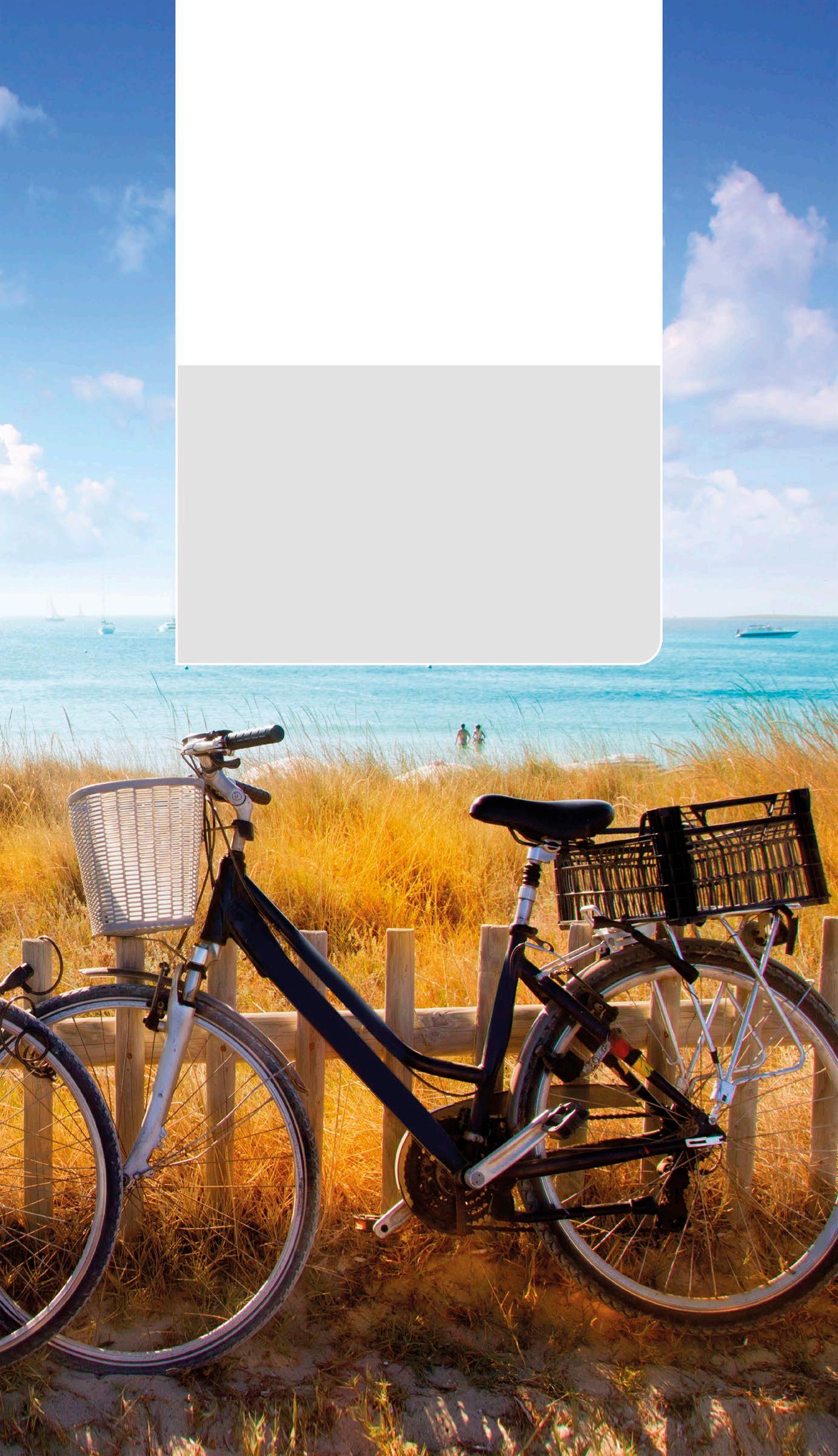
PRACTICAL INFORMATION
The Balearic Islands are one of Europe’s most popular holiday destinations. The islands have invested heavily in tourism and are geared up to receive multitudes of visitors. Hotel and catering facilities are extensive and there are plenty of attractions for the whole family to enjoy. In general, the islands are safe for visitors, although, as with any other busy resort destination, holidaymakers are vulnerable to crimes such as bag-snatching. Such crimes can often be avoided if you take sensible precautions. A well-developed information service, especially on the Internet, makes researching and planning a trip here a relatively straightforward business. During the peak period, tour operators tend to snap up the available accommodation, so be sure to book in advance. In the offseason, reservations are not as essential.
When to Visit
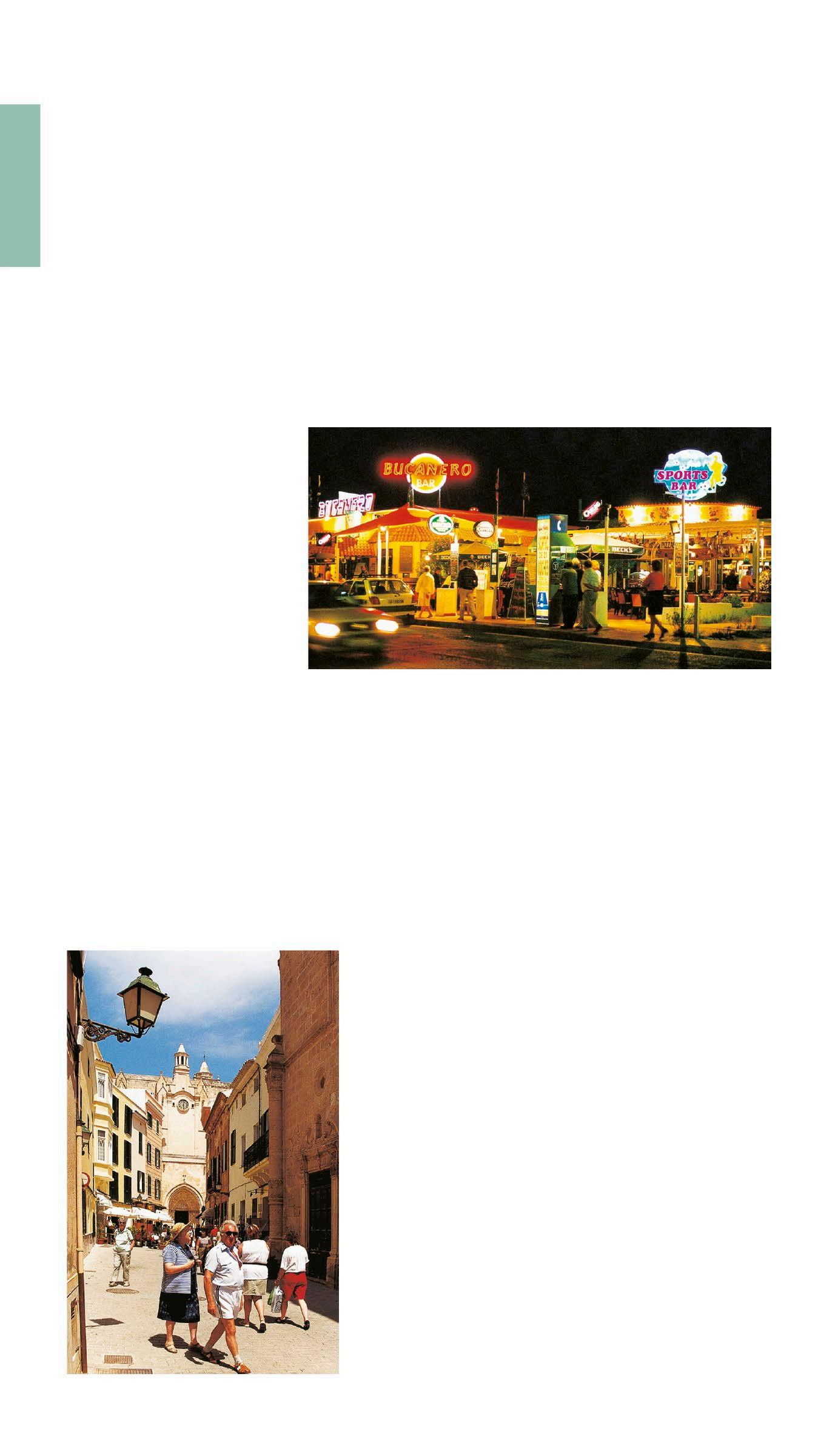
Each season has something to offer. Nevertheless, the tourist season is at its busiest from July until September. It peaks in August, which coincides with the hottest weather on the islands. The hotels, bars and restaurants fill up, beaches are full of sun-lovers and the clubs are crowded. At the height of the season you are more likely to hear German or English being spoken than Spanish or Catalan. Anyone who dislikes crowds should plan their visit for the period before the high season or when things begin to quieten down. In May, June, late September and early October, the weather is still warm enough for sunbathing. Springtime is between February and April. This is the best time for hiking, as the flowers are in bloom, although there can be heavy rain and storms at this time of year. The islands are quietest during the autumn months and December.
West End in Sant Antoni de Portmany, Ibiza
Visas
Regulations covering admission to the Balearic Islands are the same as for the rest of Spain. Nationals of all the European Union member states do not require a visa to enter the Balearic Islands. People from many other non-EU countries, including Australia, Canada, Israel, Japan, New Zealand and the USA, are likewise not required to obtain a visa before entry for tourist visits of up to 90 days. If in doubt, you should contact the Spanish Embassy or seek advice from a travel agent. Anyone who does require a visa must apply in person at the consulate in their own country. Travel Safety Advice
Visitors can get up-to-date travel safety information from the Foreign and Commonwealth Office in the UK, the State Department in the US and the Department of Foreign Affairs and Trade in Australia.
Customs Regulations
Customs regulations state in detail the limits on goods imported to and exported from the Balearic Islands. Such information may be obtained from Spanish Embassies and travel agents. Specific customs queries may be referred to the Departamento de Aduanas e Impuestos Especiales (Customs and Excise Department) in Madrid. Remember that only adults are entitled to export alcohol and cigarettes in the quantities allowed by the regulations.
Nationals of non-EU countries may apply for VAT refunds on goods purchased in any of the islands’ shops bearing the sign “Tax Free Shopping”. The refund is
worked out on the basis of the formulari (Global Refund Cheque), stamped by the Customs Officer at the point of departure before checking the luggage. The refund can be claimed at the airport, at any Cash Refund desk, or on returning home, by post or via bank transfer.
Language
The official joint languages of the Balearic Islands are Catalan and Spanish (Castilian). For many locals, however, the everyday language is Catalan. This bilingual culture can be Horse-cab ride in Palma, Mallorca felt when using local maps, where the names of places may be given in one or the other language. Catalan, in its turn, is divided into variants specific to each of the islands. In Mallorca it is known as Mallorquín, in Menorca as Menorquín and in Ibiza as Eivissenc. During Franco’s dictatorship, Catalan was banned in all public arenas. Nevertheless, the local population has never abandoned its use, and learning a few courtesy phrases in Catalan is a good way to win over the locals. Signposts on Menorca In tourist areas English and German are readily understood. Information signs and restaurant menus are generally multilingual. Greater problems with communication may be experienced away from the busiest areas. But even in the provinces, increasing numbers of people can speak at least one major European language as well as Spanish. Youths/Students
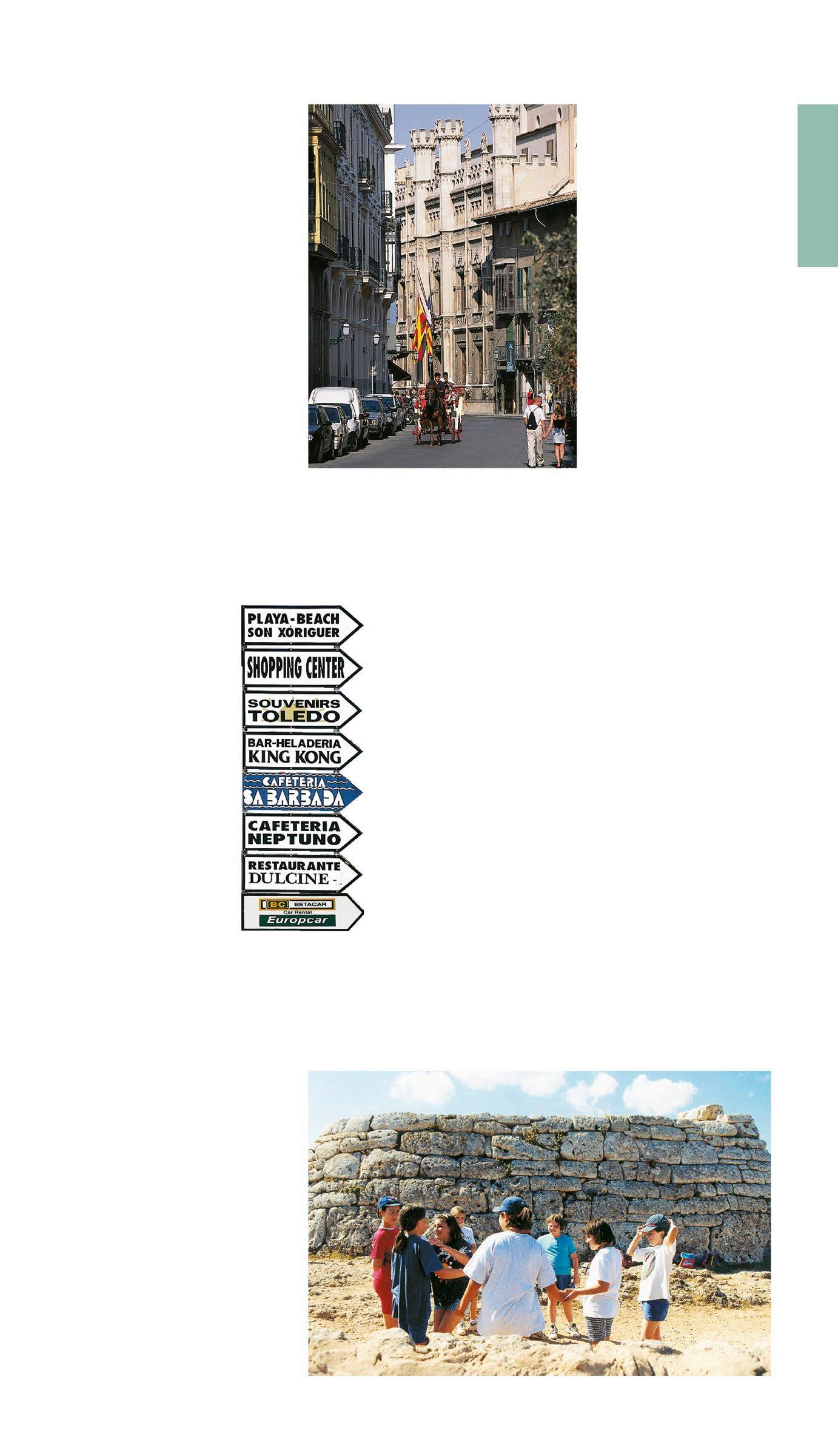
The Balearics are an ideal destination for young holidaymakers. The fine weather, great beaches and clubs attract thousands of young people from all over Europe. Some also come in search of seasonal employment, combining work with pleasure. Holders of the International Student Identity Card (ISIC) and the Euro under-26 card are entitled to many benefits when visiting the Balearic Islands. They can get discounts on ferry travel, entrance charges to museums and galleries, and tickets to some of the other tourist attractions.
Children
As with much of Spain, children are welcome in most places except the big clubs, which, of course, have age restrictions for obvious reasons. Most hotels can provide cots; some have all-day care, babysitting and special entertainment for youngsters. It is nevertheless worth checking in advance what facilities are available at any given hotel. Restaurants in hotels and in towns are also good at providing for the needs of children. They have highchairs and have special menus for children. When hiring a car, you should have no problem getting a child seat.
Tourist Information
You will find Tourist Information offices (Informació turística) in all of the larger towns and resorts on the islands. These offer free maps and information packs; they also have details of current cultural events, entertainment and available accommodation. However, the information they provide may be somewhat general in nature and it is usually limited to the town where the tourist office is located or to its immediate vicinity. A valuable source of information is the Internet. Individual islands, towns, tourist offices, hotels, car hire firms and museums all have their own websites. They usually include photographs with text written in several languages. It is therefore much simpler to do your research on a specific town before leaving home rather than once you are already there.
Stall holders at the market in Inca, Mallorca, offering a range of locally grown produce Facilities for the Disabled
mostly day-long sightseeing trips, cruises, safaris, or visits The Balearic Islands are not to casinos, theatres or clubs. particularly well equipped However, the prices you pay to deal with the needs of for these may be higher than disabled people. Most hotels those quoted by local tourist and restaurants are not agents, and it is worth browsing adapted to serve guests who through leaflets displayed at use wheelchairs, although the hotel reception desk, or new restaurants and hotels calling in at one or two local have to offer access by law. tourist offices to check what Many public places – such is on offer. as museums, galleries and shops – are also often inaccessible. Island Time When planning a All the islands are visit, it is wise to use 1 hour ahead of the services of an Greenwich Mean organization that Time (GMT), 6 hours deals with the issues ahead of Eastern of disabled people. Standard Time and Handisport Mallorca Parking sign for 9 hours ahead of is a good first stop for the disabled Pacific Standard advice. Or you can Time. The changeapproach COCEMFE (the over to summertime, as with Spanish Association for the mainland Spain, takes place on Disabled). Another helpful the last Sunday in March. The agency is Viajes 2000. clocks are put back on the last
Public transport also presents Sunday in October. a number of issues for people with limited mobility, and travelling from town to town can be difficult. Disabled visitors to Mallorca are able to use the services of a specialized company, such as EMT Special Bus Service. In terms of vocabulary, the word used to describe the early hours after midnight is la matinada. El mati means morning (up to 1pm); late afternoon and evening are translated as la tarda, while night is referred to as la nit.
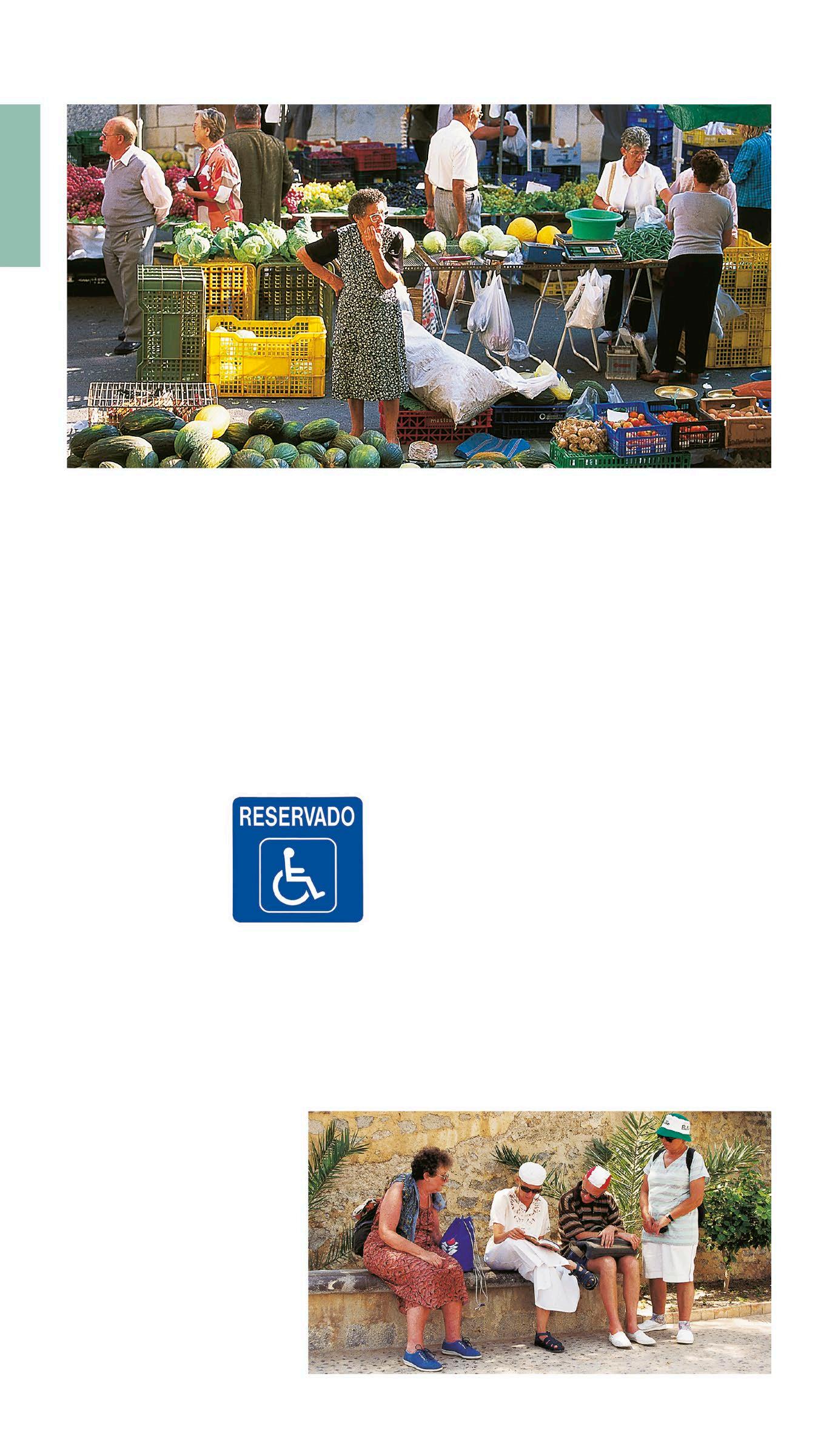
Opening Hours
Museums and historic monuments in the Balearics are generally open from Tuesday to Sunday, from 10am to 2pm and again from 4pm to 6pm. As with most offices, they close for public holidays and fiestas. Tourist information offices have similar opening hours.
Some sectors of business have started to reassess their traditional opening hours. Big department stores, for example, and hypermarkets tend to forgo the siesta and are generally open until 9pm or 10pm, though most still close on Sundays.
Excursions
Travel agents who sell holidays to the Balearic Islands usually also offer a choice of excursions for an additional fee. These are Tourists taking a break from sightseeing in Dalt Vila, in Eivissa
Theme parks and gardens are open seven days a week and they do not close for siesta. Most clubs open their doors late at night and stay open until morning. Many offices associated with tourism work shorter hours during the winter, and some close altogether.
Electrical Supply
The mains voltage on the islands is 220V AC. A three-tier standard travel convertor will enable you to use foreign equipment. Mains sockets require the European-style two-pin, round-pronged plugs. Religion
you should check its opening Like the rest of Spain the hours in advance. Hotel Balearic Islands are Roman reception desks and tourist Catholic and religion plays information centres can an important part in com- sometimes provide details. munity life. All religious festivals are lavishly celebrated and at these times the offices in town remain closed. Church opening hours vary. Some, like the cathedral church Statue on top in Eivissa, have set of a church sightseeing hours. Others, including Palma cathedral, expect a donation or charge an admission fee. Many churches are open only for services, that is early mornings or evenings (6–9pm). When planning to visit a particular religious building,
Customers relaxing at a café in Palma
Embassies in Mainland Spain
Australia
Paseo de la Castellana 259D, 28046 Madrid. Tel 913 536 600. .
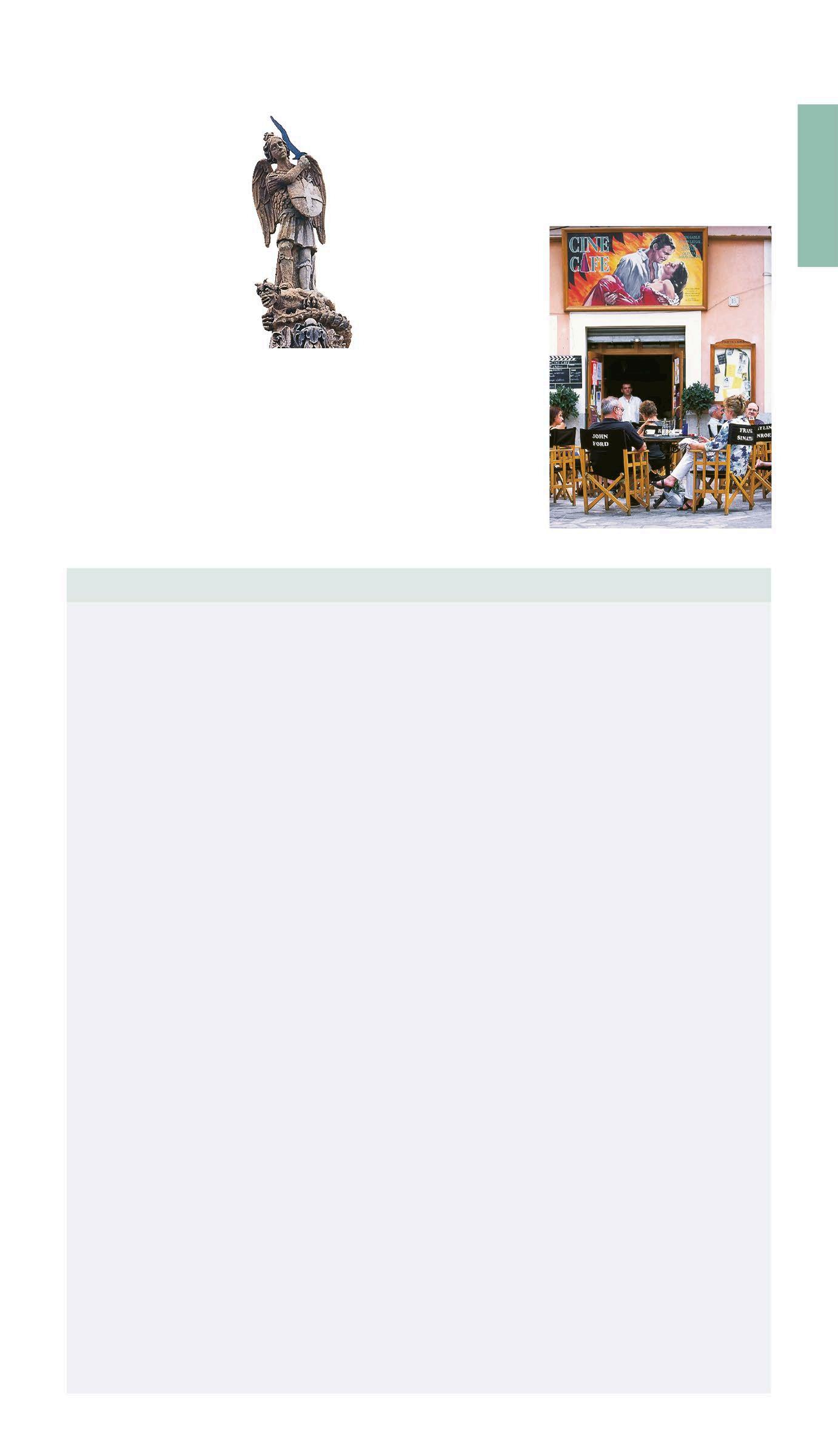
United Kingdom
Paseo de la Castellana 259D, 28046 Madrid. Tel 917 146 300.
Consulates
France
Mallorca: C/Caro 1, 1st floor G, 07002, Palma. Tel 971 730 301.
Ibiza: Avda. Bme. Vte Ramón 10, 07800, Ibiza. Tel 971 312 031.
Germany
Mallorca: C/Porto Pi 8, 3rd floor D, 07015 Palma. Tel 971 707 737. Menorca: C/Des Negres 32, 07703 Maó. Tel 971 361 668. Ibiza: C/D’Antoni Jaume 2, 2–9th floor, 07800 Eivissa. Tel 971 315 763.
DIRECTORY
The Netherlands
Mallorca: C/San Miquel 36, 6th floor, 07002 Palma. Tel 971 716 493.
United Kingdom
C/Convent dels Caputxins 4, Edif Orisba B, 4th floor D, 07002 Palma. Tel 902 109 356.
Ibiza: Avda/ Isidoro Macabich 45, 1st floor, 07800 Eivissa. Tel 902 109 356.
Travel Safety Advice
Australia
Department of Foreign Affairs and Trade ∑ dfat.gov.au ∑ smartraveller.gov.au
UK
Foreign and Commonwealth Office
∑ gov.uk/foreigntravel-advice
USA
Department of State ∑ travel.state.gov
Organizations for the Disabled
COCEMFE
Luis Cabrera 63, Madrid. Tel 917 443 600. ∑ cocemfe.es
Handisport Mallorca
Tel 971 132 268. ∑ handisportmallorca. org
Viajes 2000
∑ viajes2000.com
Tourist Information
Formentera
Port de la Savina. Tel 971 322 057.
Ibiza
Passeig Vara de Rey 1, Eivissa.
Tel 971 301 900. Fax 971 301 740.
Passeig de ses Fonts, Sant Antoni de Portmany. Tel 971 343 363.
Mallorca
Plaça de la Reina 2, Palma. Tel 971 173 990. Av. Argentina 1, Palma. Tel 902 102 365.
Menorca
Muelle de Llevant 5, Maó. Tel 902 929 015. Plaça des Born, Ciutadella. Tel 971 484 155.
Tourist Information Websites
∑ balearweb.com ∑ caib.es ∑ illesbalears.es ∑ spain.info
Formentera
∑ formentera.es ∑ formenteraonline.net ∑ guiaformentera.com ∑ visitformentera.com
Ibiza
∑ descubreibiza.com ∑ ibiza-online.com ∑ ibiza-spotlight.com ∑ ibiza.travel
Mallorca
∑ infomallorca.net ∑ visitmallorca.com
Menorca
∑ menorca.es
∑ menorca.net
∑ visitmenorca.com
Personal Security and Health
The crime level on the Balearic Islands is lower than in most regions of Europe. Thefts do occur in the most crowded places and even in hotels, but they can be minimized by taking sensible precautions. Credit cards and money are best hidden away. Never leave anything visible in your car when you park it. It is also advisable to avoid carrying excessive amounts of cash. When in need, you can always ask a policeman for help. Basic medical help and advice is usually provided by a pharmacist. Holders of valid medical insurance can receive treatment in public hospitals and clinics.
Personal Property Spanish Police
Before travelling abroad it is The island police are friendly wise to make sure you have towards tourists. They are adequate holiday insurance always ready to give advice and in order to protect yourself help. However, in case of any financially from the loss or infringement of the law, they theft of your property. Even can be very firm and it is best so, it is also advisable to take not to try to argue with them. common-sense precautions As in the rest of Spain there against loss or theft in the first are three types of police on the place. If you have two credit islands. The Policía Nacional cards, do not carry (state police), the them together and Policía Municipal, also make sure you keep a known as the Policía separate note of credit Local (local police), card cancellation and the Guardia Civil numbers. Particular (National Guard). The care should be force encountered exercised in crowded most frequently by places such as airports tourists is the Policía and bus stations. Municipal. Their Patrolling policemen officers are mostly often remind visitors Beach notice board found in small towns, about the need to be in Cala Millor and patrol the streets careful. There are also of crowded tourist cases of tourists falling victim resorts; they have a separate to theft when drunk. Never branch for traffic. The Policía leave a bag or handbag Nacional wear dark-blue unattended and do not put a uniforms. They deal with mobile phone, purse or wallet more serious incidents and on a tabletop in a café. The matters concerning foreign moment you discover a loss dignitaries; they also guard or theft, report it to the local various important buildings police. The police will give you in large cities. The Guardia a denuncia (written statement), Civil, dressed in green uniforms, which you will need to make patrol rural areas. You can see an insurance claim. If you have them while travelling the roads your passport lost or stolen, and wild areas of the report it to your consulate. Balearic Islands.
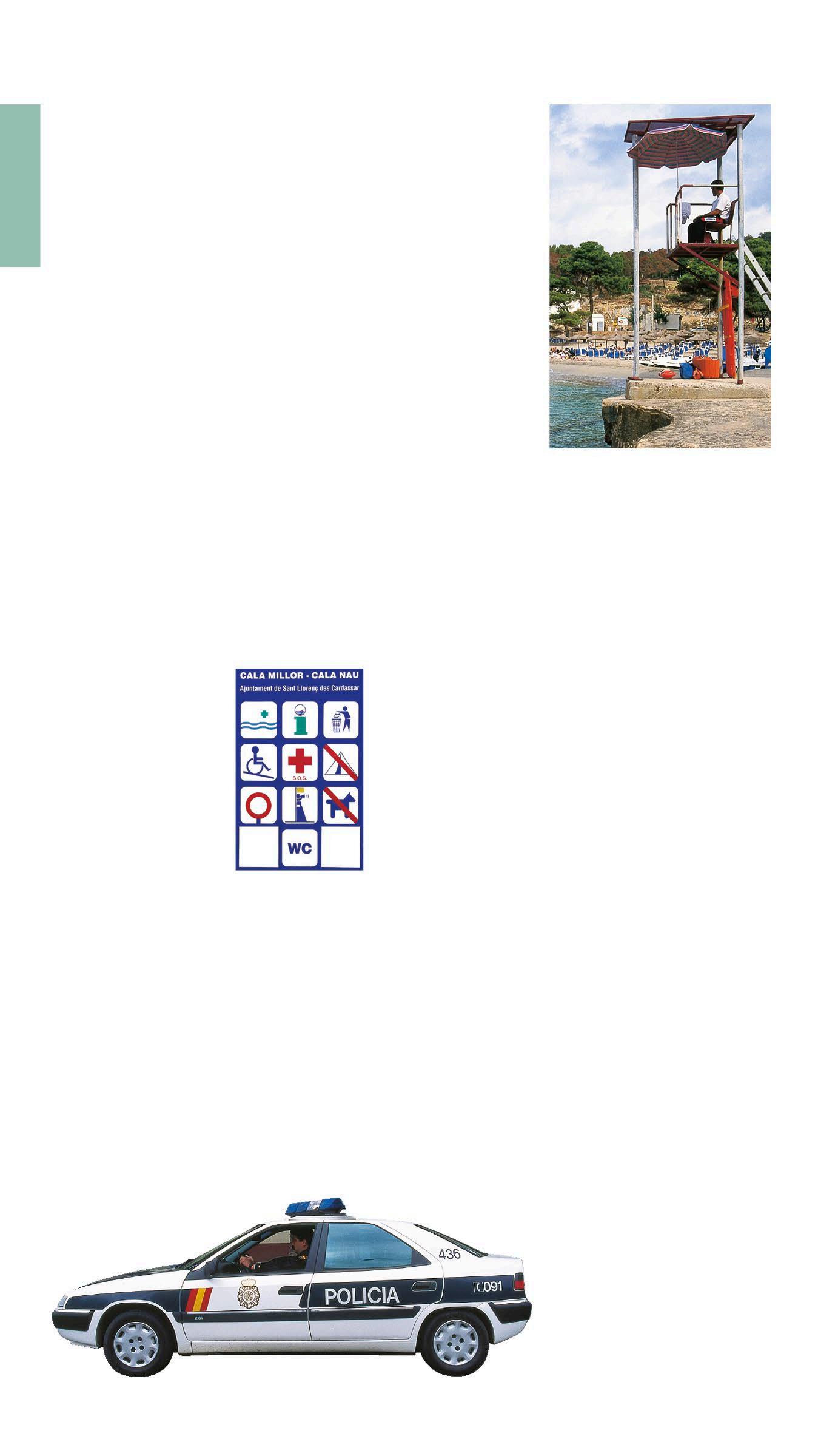
Lifeguard on duty at Sant Elm beach, Mallorca
Beaches
During the high season most beaches have lifeguards. Many beaches have swimming areas marked by buoys, although this does not mean that swimming outside these areas is prohibited. Many beaches have Red Cross stations. Notice boards at the entrance to the beach give information on facilities such as showers or wheelchair access. Many smaller beaches do not have lifeguards. Nevertheless, swimming is usually safe, as beaches are generally situated in small coves with calm waters.
The majority of the Balearic Islands’ beaches are sandy. However, those along the northern shores of the islands are often rocky. You should exercise special care when swimming off rocky beaches. It is also recommended that you use footwear when entering the water and that you watch out for underwater rocks when snorkelling. The sun should be taken seriously while on the beach. Between noon and 6pm it is best not to stay exposed for too long. It can take only minutes to get sunburned and children are especially vulnerable. Be sure to apply a high-factor sunblock cream and also make use of an umbrella. Deckchairs and umbrellas can often be hired for a fee. Drink plenty of water to avoid dehydration.
Medical Care
The UK Foreign Office advises all travellers to buy medical insurance. However, visitors from EU countries are entitled to free national health treatment if they travel with a European Health Insurance Card (EHIC), which can be obtained in the UK from the Department of Health Ambulance on Formentera or from a post office before you travel. Note that Spanish important, since when dealing helicopters dropping vast health care does not cover with minor medical problems amounts of water. It is vital, all expenses, such as the cost pharmacists are entitled to therefore, when travelling of dental treatment. Having give advice and even dis on the islands or using pic private health insurance can pense necessary medicines. nic facilities, to remember also avoid timewasting In this instance, consulting a to take great care to prevent bureaucracy. Visitors pharmacist may be enough. a fire from starting. Before from outside the EU Pharmacies on the leaving, carefully check the should always carry Balearic Islands sell remains of any bonfire and valid medical several medicines be sure to pick up glass, insurance. over the counter particularly bottles, that
In case of illness, that in other may also cause fire. It goes you should report countries are without saying that you to a hospital or clinic. available only on should be especially careful At night, patients are prescription. Away when extinguishing cigarettes seen by the Urgencias from the big towns, in country areas. (Emergency). Decorative a farmàcia may be The island firefighters pharmacy sign found in any small are called Bomberos, and as Pharmacies town or village. Here, opening hours may elsewhere in the world, they have a simple emergency Pharmacies have the same be shorter, and they are not telephone number. opening hours as other often open over the weekends. shops. They carry a green In addition, in smaller towns DIRECTORY or red cross with the word and villages the pharmacist farmàcia, or sometimes may be less used to dealing Emergency Numbers apotecaria. Details about those open at night and with foreign tourists, and communication may be Police, Guardia Civil, Red Cross, Ambulance & on public holidays can be more problematic as a result. Fire Brigadefound in the windows of all Tel 112. pharmacies. Most pharmacists in large towns speak at least Fire Hazards Pharmacies one foreign language. This is The Balearic Islands have a dry Mediterranean Formentera climate, with mild Juan Torres Quetglas. winters and hot summers. The summer heat often causes C/ Santa Maria, Sant Francesc. Tel 971 322 419. droughts since rain Ibiza falls only sporadically Farmacia Ferrer, between October C/ Formentera, and February. This 8, Figueretas, Eivissa. creates conditions Tel 971 302 737. where fire can spread Mallorca extremely quickly. Farmacia La Rambla C B Rambla Parched woodlands, Ducs de Palma 14, combined with the Palma de Mallorca. general layout of Tel 971 711 511. the land, make Menorca firefighting very Farmacia Segui Puntas, difficult. Often fire Avda Vives Llull 16, Maó. fighting necessitates Tel 971 360 993. Firefighting aeroplane on Ibiza aeroplanes and
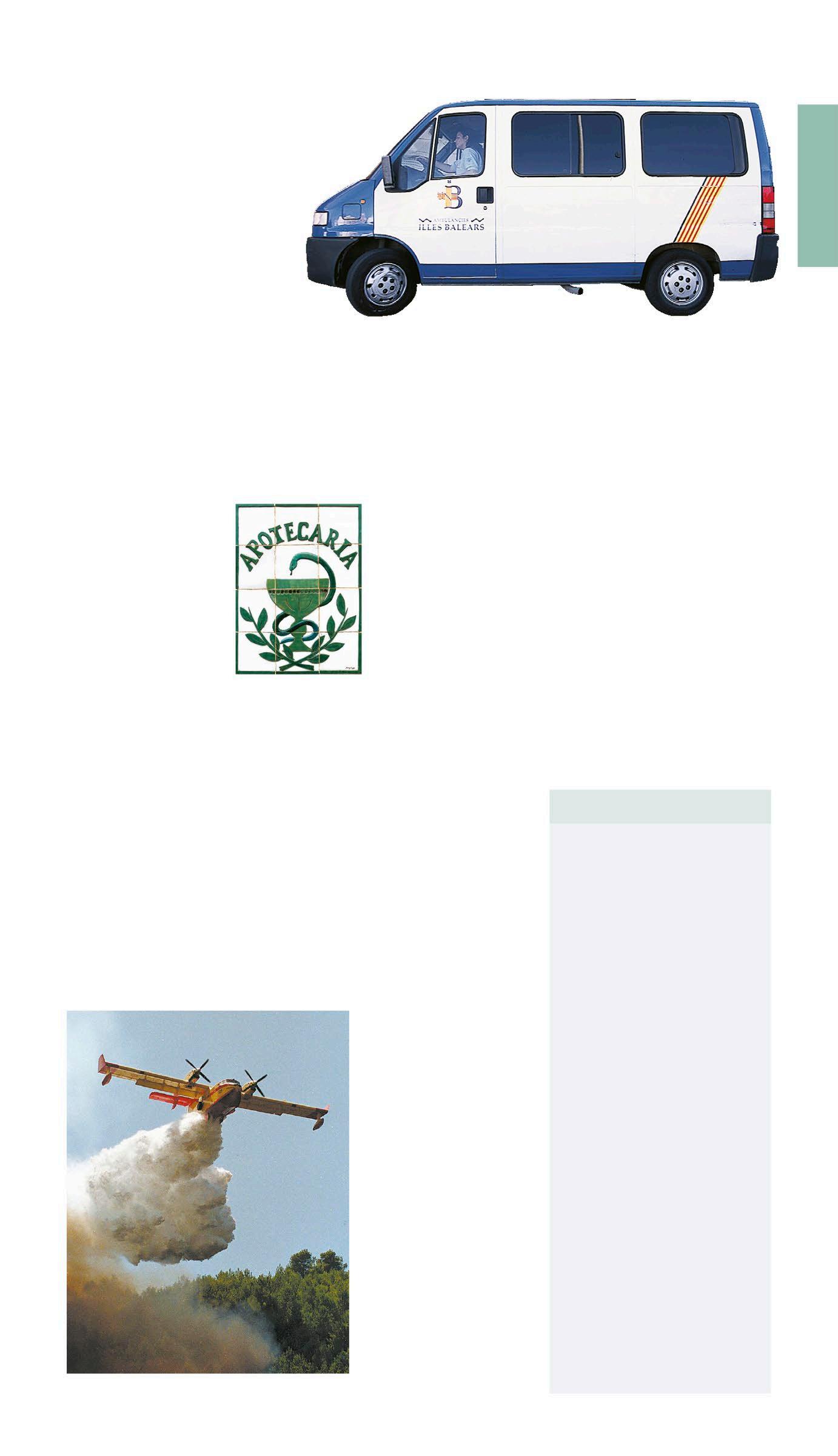
Communication and Banks
The quality of telephone services in the Balearic Islands is high for both landlines and mobile phones. The banking services on the islands are equally efficient and many foreign banks, mainly German, have branches here. The Spanish postal system functions quite well, but it may take a week or longer for a letter posted in the Balearic Islands to reach its destination. When communicating with Spanish companies, it is best to use email.
Telephones and Mobile Phones
You will be able to enjoy good mobile-phone reception in all but the most remote corners of Mallorca and Menorca, with the network fixed at GSM900/1800, the band used in the rest of Europe, Australia and New Zealand. Mobile phones purchased in North America will need to be adjusted to this GSM band.
Rather than using your own mobile phone, you may find it cheaper to buy a local SIM card. Bear in mind, however, that this can get complicated: many mobiles will not permit you to swap SIM cards, and the connection instructions for the replacement SIM card may be in Spanish only. If you overcome these problems, you can buy SIM cards at high-street phone companies, which offer myriad deals beginning at about €5 per SIM card.

Bright and easy-to-spot post box belonging to the Spanish correos When dialling a number you should remember that Postal Service in Spain you must always dial The Spanish postal system the full nine-digit number, is now quite efficient, and even if you are in the same postcards and letters sent area. The code for the Balearic from the islands take a couple Islands is 971. Making a call of days to reach the addressee. from Mallorca to Menorca It is also possible to send will cost the same as one express (urgente) or registered from Palma to Andratx. (certificado) mail.
When telephoning the Post offices are open betBalearic Islands from the UK, ween 8:30am and 2:30pm Ireland and New Zealand, you Mondays to Fridays (main must first dial 0034 (the country offices are open to 8:30pm), code for Spain) followed by and between 9:30am and the subscriber’s number 1pm Saturdays. If you only starting with want stamps, the area code note that (971). When these are also calling a sold at kiosks mobile phone bearing the number you Logo of Movistar sign timbre or should dial the at tobacconists; country code, followed by or, ask at your hotel reception. the subscriber’s number. Postal charges depend on To phone the UK from the where the item is being sent Balearic Islands dial 0044, to and fall into bands that then the area code (minus the include the EU, the rest of 0), then the number; to phone Europe, the USA and the rest Ireland dial 00353, then the of the world. Post offices also area code (minus the 0), then accept telegrams, registered the number; to phone the US mail and parcels. Letters and or Canada dial 001, then the cards can be mailed in a area code, then the number. yellow post box.
Internet
All hotels and airports, plus a large number of bars, on the Balearic Islands have Internet hot spots, but be aware that sometimes they will charge you a small fee for access, and you will usually need to ask for a password. Cafés with free Wi-Fi are mainly found in the city centres. Nearly all hotels have at least one computer for guests to send emails. Currency
The euro (€) is the common currency of the European Union. It went into general circulation on 1 January 2002, initially for 12 participating countries. Spain was one of those 12 countries, and the Spanish peseta was phased out in January 2002. Euro notes, in denominations of €5 to €500, are identical throughout the Eurozone countries, while the coins
have one side identical (the value side), and one side with an image unique to each country.
Banks and Cash Dispensers
The easiest way to get cash is from a cash dispenser, or ATM, and these are ubiquitous across the Balearic Islands. Note that most major credit and debit cards are accepted. However, with credit cards you will be charged a supplementary fee; this is not the case with debit cards. For changing currency, most banks are open from 8am until 2pm.
One of the many cash dispensers available on the islands
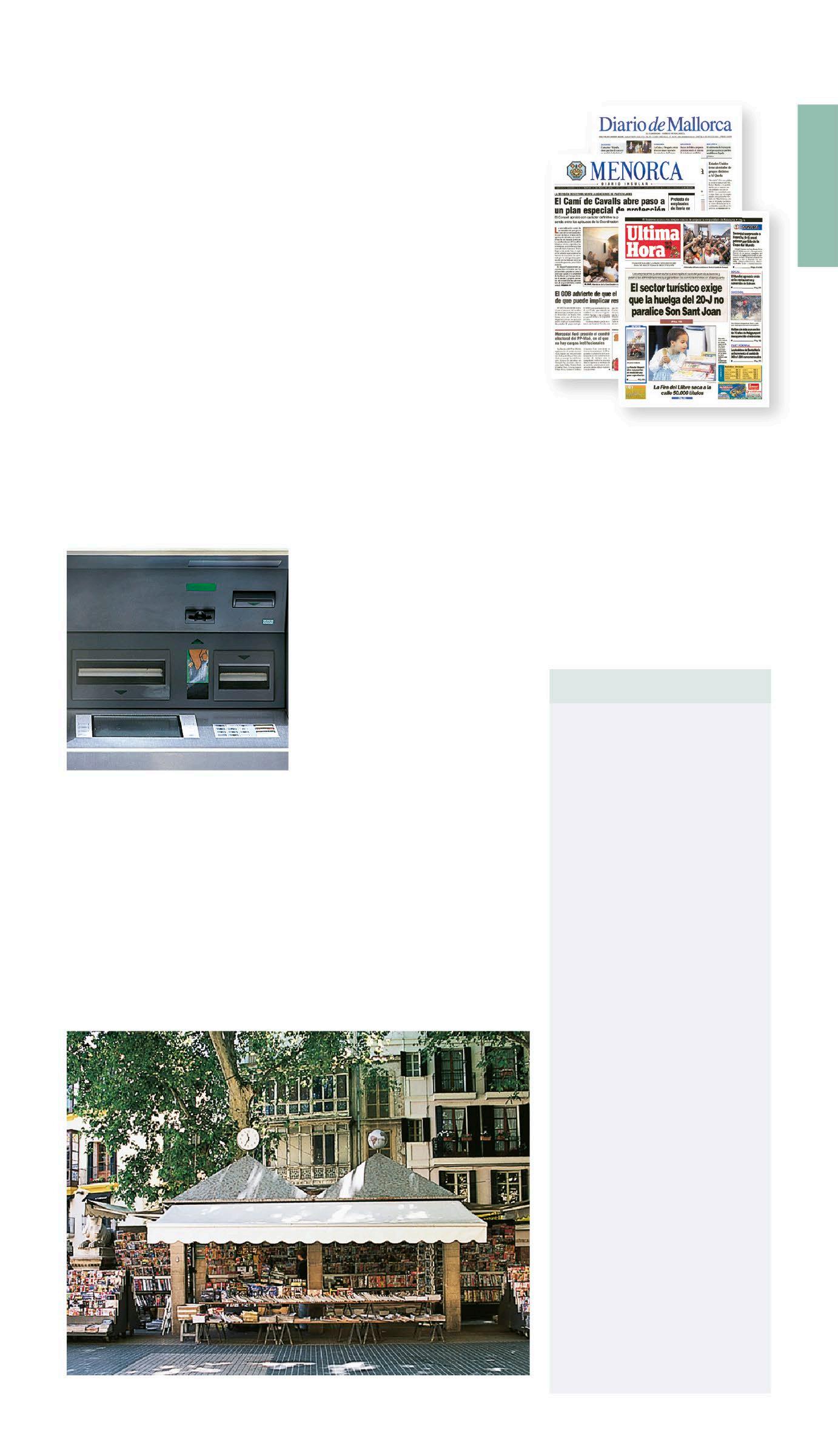
Debit and Credit Cards
The most widely accepted credit cards on the Balearic Islands are Visa and MasterCard. However, most cash dispensers, as well as shops, hotels and restaurants, will also accept American Express or Diners. When you pay with a card, staff will usually pass your card through a reading machine. Sometimes you may be asked to punch in your PIN number. Some smaller places, such as market stalls and independent shops may not accept credit cards.
Radio and Television
Numerous pubs and cafés have a television and it is easy to watch major sporting events live, including many English and German league soccer matches. Hotels have a larger selection of TV channels. Besides Spanish national TV, such as TVE1 and TVE2, there are a number of local channels including Catalan TV3 and Canal 33. These broadcast mainly Spanish news and light entertainment shows..
You can tune into the BBC’s World Service 24 hours a day online or through audio channels offered by local TV providers in some hotels.
Newspapers
Several local newspapers are published on each of the islands. These cover mainly local issues and they can also be valuable sources of information for visitors who want to find out about forthcoming cultural and sporting events. They also publish useful addresses and telephone numbers. Some of the local newspapers have foreignlanguage supplements. In many towns, kiosks and hotels sell Spanish national papers as well as British and German newspapers and magazines. The majority of popular publications from other EU countries arrive on the Balearic Islands with a minimum delay.
Popular dailies published in the Balearic Islands
DIRECTORY
Post Offices
Ibiza
Avda Isidor Macabich 67, Eivissa. Tel 902 197 197.
Mallorca
Constitucio 5, Palma. Tel 971 721 095.
Menorca
C/Bon Aire 15, Maó. Tel 971 356 629. Pl Borne 9, Ciutadella. Tel 971 380 081.
Lost or Stolen Credit Cards
American Express
Tel 1273 696 933.
Diners Club
Tel 1273 696 933.
MasterCard Tel 900 971 231.
Visa
Tel 900 991 216.







